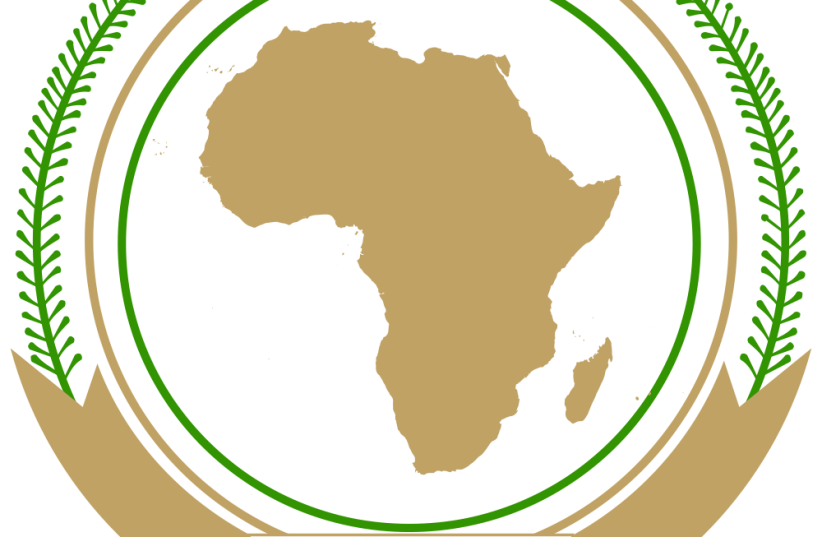by Lahav Harkov
The African Union’s Executive Council will vote this week on Israel's observer status, requiring a 54 member majority.
 |
The emblem of the African Union.
(photo credit: Wikimedia Commons)
|
With the planned vote approaching this week, Prime Minister Naftali Bennett and Foreign Minister Yair Lapid have taken an active part in the efforts to ensure Israel doesn’t lose its observer status in the African Union.
The African Union’s Executive Council is set to convene in Addis Ababa on Wednesday, with heads of state in attendance, and South Africa and Algeria have been leading the push for a vote to remove Israel.
Bennett spoke with the president of Senegal on the topic last week – in the middle of an interview with The Jerusalem Post – and Lapid has spoken with, among others, his counterparts in Togo and Burundi in recent weeks.
Two-thirds of the 54 member states of the African Union would have to support the motion in order for Israel’s observer status to be revoked, and a diplomatic source in Jerusalem said on Sunday that he was optimistic that Israel has the votes it needs.
It is also possible that the vote will be postponed; it had previously been pushed off the AU’s foreign ministers’ summit. A situation in which the motion is postponed into oblivion would also be favorable for Israel, the source said.
 Israeli prime minister Naftali Bennett, Minister of Foreign Affairs
Yair Lapid and Minister of Defense Benny Gantz seen during a discussion
on the Electricity Law connecting to Arab and Bedouin towns, during a
plenum session in the assembly hall of the Israeli parliament in
Jerusalem, January 5, 20 (credit: YONATAN SINDEL/FLASH90)
Israeli prime minister Naftali Bennett, Minister of Foreign Affairs
Yair Lapid and Minister of Defense Benny Gantz seen during a discussion
on the Electricity Law connecting to Arab and Bedouin towns, during a
plenum session in the assembly hall of the Israeli parliament in
Jerusalem, January 5, 20 (credit: YONATAN SINDEL/FLASH90)“Most countries are happy that we’re there,” the diplomatic source said, “but some were opposed to the process.”
Israel rejoined the African Union as an observer in July 2021, when its commission chairperson Moussa Faki Mahamat announced the move, supported by the current African Union chairperson — President of the Democratic Republic of the Congo Felix Tshikedi. While Mahamat had the authority to do so unilaterally, he believed he had majority support when he gave Israel the status, a diplomatic source said.
Since then, 21 AU member states have protested the move, though many were specifically opposed to being presented with facts on the ground without a discussion.
South Africa, Algeria, Zimbabwe, Namibia and Botswana were among the countries that opposed Israel rejoining the AU, as did nearly every Muslim-majority country in Africa, except for Morocco and Chad, which established diplomatic relations with Israel in recent years, and Sudan, which is in the process of doing so.
Egypt signed on to at least one of the protest letters against Israel’s re-admission, with a diplomatic source saying it was mainly out of a preference for AU decisions to be made by consensus.
Comoros, an island country off the east coast of Africa and a member of the Arab League with which Israel has been in negotiations to establish diplomatic relations in recent months, also opposed Israel’s AU observer status.
Only 11 out of 54 AU member states do not have full relations with Israel, and several of those 11 have understandings with Israel, such as Djibouti, which allows Israeli ships to pass through its waters.
The AU was founded in 2002, with Israel as an observer. Israel was ousted from the AU in 2003, in a campaign spearheaded by Muammar Gadhafi, the Libyan dictator at the time.
Lahav Harkov
Source: https://www.jpost.com/israel-news/politics-and-diplomacy/article-694999
No comments:
Post a Comment